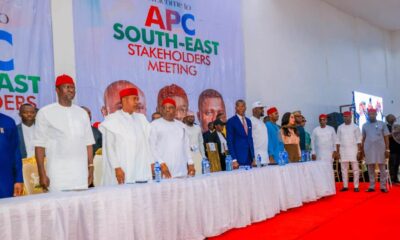GROpinion
Take your Food and Offer us Education-The Cry of The Nigerian Child


It is a common knowledge that education brings about quality human capital, without which development remains a far cry. No nation of the world that has achieved sustainable development ever gave education a trivial concern, or subjected it to a trite status. According to Nelson Mandela, “Education is the most powerful weapon which you can use to change the world”. The Nigerian situation does not seem to be in sync with the global best practices with regard to the promotion of education at all levels. For the purpose of this essay, I would limit the understanding of “education” to the outcome of what a student gains from the formal schools – elementary, secondary and tertiary within the school system.
The commitment to education of government at all levels within the Nigerian federal system is codified in the 1999 Constitution of the Federal Republic of Nigeria under section 18 (3) a-d as cited here: “Government shall strive to eradicate illiteracy; and to this end Government shall as and when practicable provide
- Free, compulsory and universal primary education;
- Free secondary education;
- Free university education; and
- Free adult literacy programme.
Remember that all the sections within the Chapter II of our constitution: Fundamental Objectives and directive Principles of State Policy is not justiciable; that is to say, the government cannot be taken to court to challenge its performance in all of those policies. And the Chapter II of the Constitution houses the social charter upon which the policies of the government hinge. I feel that this obnoxious immunity formed the reason why the framers of the Constitution had to insert the proviso of “as and when practicable” in relation to the Government’s commitment to education. With the proviso of “as and when practicable” we all reap today the forbidden fruits of poor, underfunded and undervalued education in Nigeria.
Education in Nigeria falls within the EXCLUSIVE LIST wherein the Federal and State Governments have joint stake. Thus, education is administered by the federal, state and local governments. The Federal Ministry of Education is responsible for overall policy formation and ensuring quality control, but is primarily involved with tertiary education. Secondary [emphasis mine] school education is largely the responsibility of the state government, and local government, the elementary education – visit www.wenr.wes.org/2017/03 for further details.
Because of poor commitment in the part of our government, there is lack of adequate education for the children, which weakens the Nigerian education system at its foundation. The basic education system remains underfunded; facilities are often poor, teachers inadequately trained, and participation rates very low by international standards.
With the coming on board of the APC Government, the Feeding Programme was introduced in public primary schools. Known as Home Grown Feeding Programme, it was designed to boost enrollment in primary schools. But I think this is a wrong programme. Why parents may not want their children to go to school is because many of the graduates within the same family have got no job as a result of dysfunctional education they acquired. Using food to draw children to schools without offering them sustainable and functional education will make them even worse than the graduates that have no jobs and at the same time unemployable.
Why should a Nigerian child undergoing basic education be offered a malnourished plate of rice as substitute for good education? That for me is a plate of rice without educational nutrient. The Nigerian child today is raising a cry summed up in this demand: Take your food and offer us education. If it costs the APC-led Federal Government say N300.00 to feed a child per day, let us do the math and know the cost implication. N300 x 5 days of school attendance will give us N1,500 per week multiplied by 4 weeks in a month, which will give us N6,000. When we multiply this further by 9 months which are the aggregate months in an annual academic calendar for 3 months termly studies (N6,000 x 9) we will get N54,000. The calculated amount will triple if pupils will be fed from Primary One to Three. The total amount for the year is enough to give a Tab or Computer to a pupil in the elementary school.
Feeding a child is the primary responsibility of every family on earth. But in Nigeria, public office holders will steal away that money that would have empowered families to feed their children, only to return a paltry sum through the window of Home Grown Feeding Programme to give same food to the children in Primary Schools which was divested of the dining tables in their families as a result of corruption in Nigeria.
I believe that what will guarantee quality education to a Nigerian child would include: well-paid teachers that won’t use the excuse of unpaid salaries to stay away from schools, good study environment, equipped and functional library with Internet connectivity and other educational resource materials. I join every Nigerian child to ask our government to offer our children education and not food. Their feeding should be left in the hands of their families. And that will become affordable for our families when our economy runs on proper development indices under full employment. Malala Yousafzai says: “One child, one teacher, one book, one pen can change the world”, she didn’t say, or added: “A plate of rice”.
Written by Herbert Chimezie Nnadi (IgedenwaAfrika)
Lecturer at Imo State Polytechnic and Social/Political Affairs Analyst
-



 GROpinion6 hours ago
GROpinion6 hours agoThe Dark Side of Failing the Citizens and the Paradoxical Thriving of Undemocratic Politicians in Democracy
-





 News4 days ago
News4 days agoAbuja Programme of activities for late Barrister Princess Nwamaka Mediatrix Chigbo
-



 GRPolitics5 days ago
GRPolitics5 days agoS’East Governors, APC leaders, Stakeholders Endorse Tinubu for Second Term
-





 News4 days ago
News4 days agoGOCOP condoles with former president on Death of her sister






